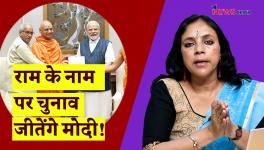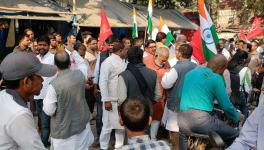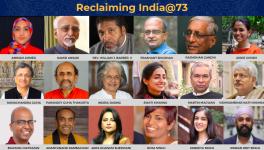The Whataboutery of Kangana Ranaut and Company

The open letter of 62 public personalities manipulates facts and deliberately confuses different forms of political violence to normalise lynching. Titled Against Selective Outrage and False Narrative, the signatories to the letter include Hindi film star Kangana Ranaut, lyricist Prasoon Joshi, classical dancer and Rajya Sabha MP Sonal Mansingh, film-makers Madhur Bhandarkar and Vivek Agnihotri.
Their motive to release the letter to the public is aimed at shaming and discrediting a group of 49 artistes and intellectuals, who had earlier written to Prime Minister Narendra Modi to express their worries over the spurt in lynching in recent times. The group of 49 had noted, “Regrettably, ‘Jai Sri Ram’ has become a provocative ‘war-cry’ today… and many lynchings take place in its name.”
Ranaut and Joshi et al cite 12 instances when they thought the group of 49 should have spoken but did not. And because they did not speak on those occasions, they have been accused of foisting a “false narrative with the intention of denigrating the democratic ethos and norms of our collective functioning as a nation and people.” Their purpose, the group of 62 claims, is to tarnish “India’s international standing” and to “negatively portray Prime Minister Modi.”
For a group taking such a lethal swipe against the 49 artistes and intellectuals, it is incredible it should falter pathetically over the facts of 12 instances, which have been either concocted, or have been grossly exaggerated, or suffer from conceptual flaws.
For instance, the group of 49 is accused of keeping silent “when Hindus in Kairana (UP) had to migrate leaving their home and hearth behind.” The issue of a Hindu exodus was first raised by the late Bharatiya Janata Party leader Hukum Singh, who had, in June 2016, released a list of 346 families which had allegedly left Kairana because of extortion by Muslim gangs. Singh’s allegation raised a furore, prompting the local administration to undertake an investigation into the whereabouts of 119 families on Singh’s list.
It was found that out of 119 families, 68 had left Kairana 10-15 years ago for employment, business, education of children, etc; four persons on Hukum Singh’s list were dead and 13 families were still living in Kairana. The remaining families had left Kairana over five years ago due to a variety of reasons, but hadn’t sold their ancestral property, homes and shops in Kairana. Embarrassed, Singh began to equivocate on his allegation. “I never raised the issue of exodus of any particular community. The issue I had raised was just of exodus generally.”
The group of 49 is accused of remaining silent “when students were fired upon in Daribhit High School, Islampur, just because they wanted teachers for Bengali, Geography and Computer Application instead of being forced to learn Urdu.”
From the charge, it would seem the students were protesting against the imposition of Urdu. However, according to an Indian Express story, villagers and students were angry over the “appointment of Urdu teacher Md Sanaullah Rehmani and Sanskrit teacher Touranga Mullick, while they had been demanding teachers for science and other subjects.” The narrative makes it clear that the students were angry not because they were being forced to learn Urdu, but because of the paucity of teachers for certain subjects.
The group of 49 is accused of remaining mum “when Jagannath Tudu was bludgeoned to death in Purulia just because he followed a different political ideology from that of the ruling dispensation in West Bengal.” An investigation by NDTV, a news channel, showed Jagannath Tudu hadn’t been bludgeoned to death. About his death, the channel’s website noted, “In the case of Jagannath Tudu, also from Purulia, who died in May last year due to a road accident, the original complaint never mentioned the TMC [Trinamool Congress.]”
Likewise, the group of 49 is castigated for remaining silent when, in 2014, “Hindus of Sandeshkhali”, in North 24 Parganas district, West Bengal, were “prevented from exercising their franchise and were terrorised by Shah Jehan Sheikh.” The statement makes it appear that Sheikh, a Muslim, went around targeting Hindus, who were as helpless as victims of lynching often are.
A report in the Times of India, however, tells us that the clash, in reality, was one between the Trinamool and BJP. Sheikh was indeed leading the gang. The BJP, however, isn’t a pushover in Sandeshkhali. As the TOI report says, “BJP has always had a base here since 1989, consolidating along religious lines in Muslim-dominated Basirhat Lok Sabha seat [which includes Sandeshkhali].”
In much the same vein, the group of 49 is asked to explain its silence on the violence during the 2018 panchayat and the 2019 Lok Sabha elections in West Bengal, where all “those who chant Jai Sri Ram were imprisoned, were called criminals and were being killed and maimed.” The BJP has been using ‘Jai Sri Ram’ as a political slogan, which the mahant of Varanasi’s Sankat Mochan Temple, Vishambhar Nath Mishra, recently condemned.
That apart, Ranaut and Joshi et al have sought to conflate political violence with lynching. Both these forms of violence, even though reprehensible, are conceptually different. Political violence in West Bengal has had cadres of the TMC and the BJP to attack each other because of their political identity. Their quest is to establish electoral dominance. It isn’t that the BJP has been innocent of political violence, whether in West Bengal or elsewhere.
By contrast, victims of lynching are targeted for their religious or caste identity. In almost all cases of lynching until now, the victims were neither the assailant nor sought to retaliate even as they were attacked, outnumbered by blood-thirsty mobs. They weren’t engaged in political competition.
The group of 49 has expressed its shock over lynching because the only motivation of killers seems a deep hatred for the victim’s religion. This was underscored in the letter the group of 49 wrote to Modi: “…254 religious identity-based hate crimes were reported between January 1, 2009 and October 29, 2019, where at least 91 persons were killed and 579 injured… About 90% of these attacks were reported after May 2014, when your government assumed power nationally.”
The group of 49 is implicitly accusing the Narendra Modi regime of creating a political ambience encouraging of lynch mobs. The group asks Modi: “You have criticised such lynchings in Parliament Mr. Prime Minister, but that is not enough! What action has actually been taken against the perpetrators?”
In a counter, Ranaut and Joshi et al ask the group of 49 to explain their silence “when complaints of being forced to chant Jai Sri Ram were being repeatedly exposed as being false and concocted.” Unlike the group of 49, which cited sources from where they secured their data, Ranaut and company do not disclose how many of those who alleged they were forced to chant Jai Sri Ram were proved wrong. The OpIndia website, which tilts to the Hindu Right, cited three instances in a July 19 report. Is it justified to infer from three false claims that complaints of being forced to chant Jai Sri Ram were repeatedly exposed as concocted?
In an ironical twist, on the day Ranaut and Joshi et al released their open letter – July 26 – CP Singh, a BJP minister in Jharkhand, mounted pressure on Congress legislator Irfan Ansari to chant ‘Jai Sri Ram’ outside the Assembly in Ranchi. The video of the verbal duel between Singh and Ansari went viral, undeniably demonstrating that the charge against the group of 49 for creating “false narrative” is itself palpably false.
Ranaut and Joshi et al take the 49 artistes and intellectuals to task for remaining silent “when there was a concerted conspiracy by a certain section, taking advantage of the Sabarimala Temple entry movement, to disguise themselves and try and enter the temple and thus hurt the sentiments of millions of devotees.”
Ranaut and Joshi et al forget that there was a Supreme Court order allowing menstruating women to enter the temple. It was the Constitutional obligation of the Kerala government to facilitate the entry of women activists who wished to enter the Sabarimala temple. Regardless of the position each of the 49 artistes and intellectuals on the Sabarimala Temple, those advocating a ban on the entry of menstruating women had the support of the two national parties – the BJP and Congress. They were certainly not as helpless, and powerless, as victims of lynching are, precisely why the group of 49 chose to articulate the worries of religious minorities and Dalits.
Ranaut and Joshi et al say the group of 49 was “silent when Kashmiri Pandits were driven out of the Valley and have never till date spoken of their plight.” This is a palpably false claim. For instance, public intellectual Ramachandra Guha, who was one of 49 signatories to the letter sent to Modi, wrote in August 2015, “The process of reconciliation in Kashmir cannot escape the question of the Pandits. The people I talked to in Srinagar used the euphemism ‘migration’ to describe the exit from the Valley of the Kashmiri Hindus who had long lived there. The truth, of course, is that they were made to flee, forced into exile.”
Guha went on to add, “It is now twenty-five years since the majority of the Pandits left…Many older Kashmiris do, and deeply regret the absence of their fellows. But of plans to bring them back or to effect an emotional reconciliation there were few signs.” Quite obviously, it is the group of 62 which excels in creating a false narrative.
Ranaut and Joshi et al have taken exception to the group of 49 remaining silent when “temples were vandalised in Kalichak, Denanga, Baduria, Raniganj and even as late as in July 2019 in Chandni Chowk in Delhi.” Other than Chandni Chowk, all other places are in West Bengal. It is unbecoming of Indians to vandalise places of worship. It is incumbent upon the state to identify those guilty and severely punish them. In Chandni Chowk at least, its Muslim residents fed those who took out a procession to re-install the idols in the temple there.
Nevertheless, it does seem rich of 62 personalities, who come across as Modi and BJP bhakts, to complain against the desecration of temples. Their most favoured party launched a movement to appropriate the Babri Masjid, which was subsequently demolished on December 6, 1992. It sparked off riots in which hundreds died across the country.
It is possible that the 62 personalities are genuinely worried over, say, the political violence in West Bengal. In that case, they should have addressed their letter to the Prime Minister or the West Bengal Chief Minister. It is inexplicable why they should want the group of 49 to speak on issues agitating them. Different classes of citizens have different concerns, which they expect the state to address. For instance, it can’t be the case that just because farmers haven’t protested against lynching, they relinquish their right to demand a better deal for themselves.
Indeed, Against Selective Outrage and False Narrative is a classic example of whataboutery, a tactic the BJP activists mastered during the implementation of the Modi government’s demonetisation policy in 2016. Anyone who complained of hardship because of the absence of currency notes was reminded of soldiers who imperiled their lives to guard the border. Likewise, the whataboutery of Ranaut and company is aimed at fanning public sentiments against those who question Modi, to scare them into silence.
Get the latest reports & analysis with people's perspective on Protests, movements & deep analytical videos, discussions of the current affairs in your Telegram app. Subscribe to NewsClick's Telegram channel & get Real-Time updates on stories, as they get published on our website.
























